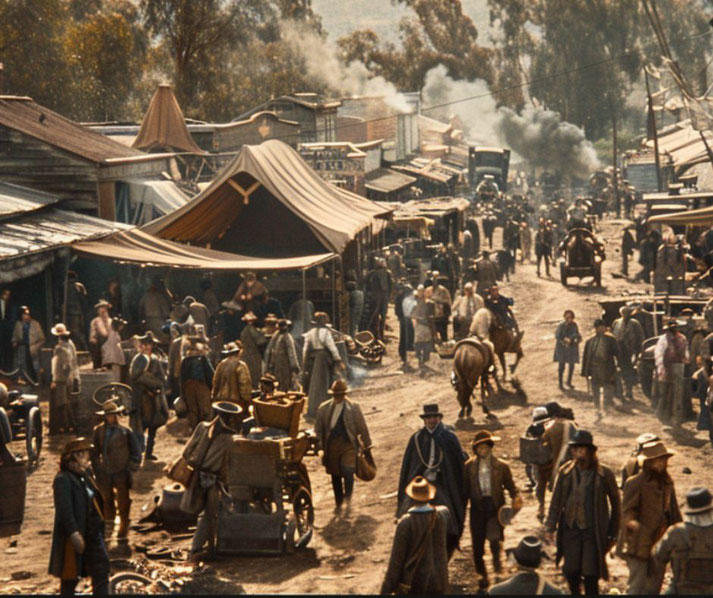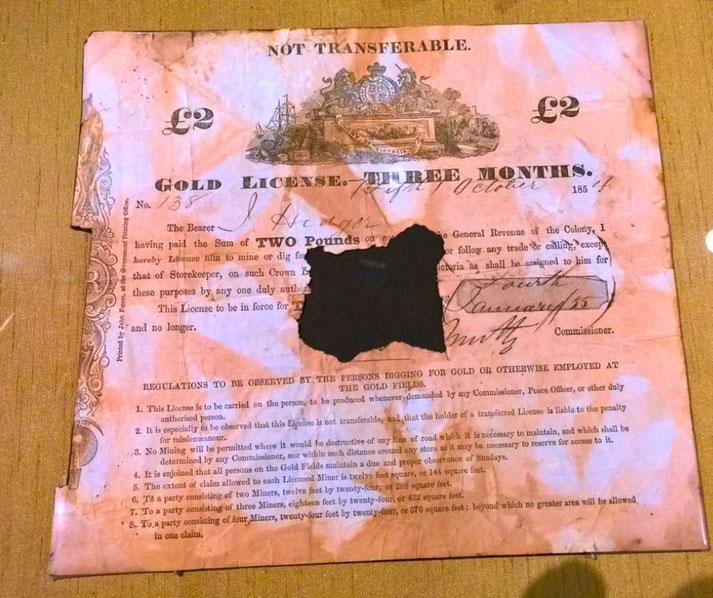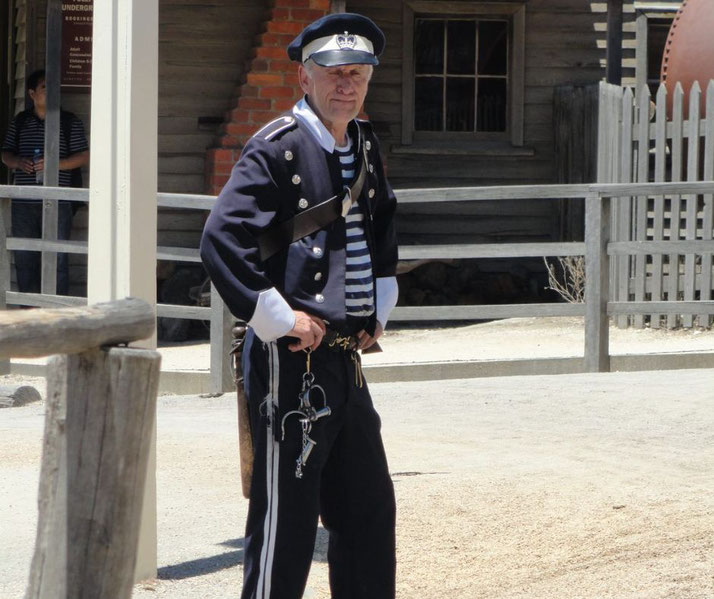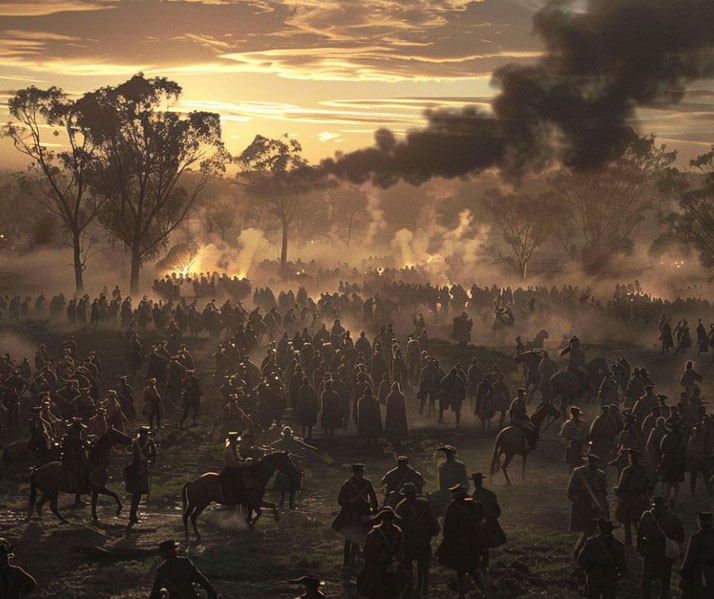What happened at the Eureka Stockade in 1854?

In 1851, gold was discovered near Ballarat, Australia, and the resulting gold rush brought thousands of prospectors to the area.
The miners were forced to live in squalid conditions, and they were subject to high taxes and other unfair treatment from the government.
In December of 1854, a group of miners at Ballarat rebelled against these injustices. 22 miners and six soldiers would be killed in the rebellion which would become known as the Eureka Stockade incident.
Background
Gold had been discovered in New South Wales in February 1851, and in June, it was also discovered in Victoria.
The resulting gold rush brought thousands of prospectors to the area. People believed that they could make their fortunes by finding gold, and this led to a massive influx of people from all over the world.
The majority of these prospectors were men, but there were also a significant number of women and children who came to Australia in search of gold.

The influx of people put a strain on the existing infrastructure in Australia. There was not enough housing or food to accommodate all of the new arrivals, and many people ended up living in squalid conditions.
By 1860, Victoria’s population had increased to 540,000 people. The goldfields quickly became a chaotic place, with thousands of tents being set up with no proper toilets, showers, roads, shops or even doctors for people to use.
Ultimately, the government wanted to reduce the number of people on the goldfields as well as raising money to pay for the services miners needed.
To solve these problems, the colonial governments imposing a new monthly fee on the miners.
Any person who wanted to continue mining had to pay for a licence to do so. The licence would only last for one month and people had to pay for a new one each month to continue digging for gold.
For example, the New South Wales Governor Charles Fitzroy and Lieutenant-Governor Charles La Trobe of Victoria both introduced a licence fee of 30-shillings per month.
The implementation of licenses was one way that the governments could monitor the numbers of people migrating to the goldfields as well as raising money to build new infrastructure to support the growing states.
Many miners were angry when they received the news of the cost of the new licences, there was a lot of frustration.
For those people who were British, the cost was also doubled.

Conflict begins
Most miners could not afford the cost of the new licenses, as they often did not find enough gold each month to cover the fee.
As a growing number of miners began not paying the fee, the government sent in police and soldiers to regularly check every miner. Sometimes, they were checked two or three times a day.
These 'licence hunts' were a cause of growing anger, as they were conducted in an unfair and heavy-handed manner.
Some police, who were ex-convicts, would take bribes, while others refused to take bribes but were particularly harsh with those they arrested.
A number of those arrested were chained to trees, others were marched through towns to be publicly humiliated, and others were left in jail for days at a time without food.
Word also spread that the police got paid extra money from the government for every miner they arrested for not having their licences.
These reasons were at the heart of the grievances that led to the Eureka Stockade rebellion.
Then, on the 8th of October 1854, the situation in Ballarat turned violent when a well-known miner named James Scobie was murdered during a fight near the Eureka Hotel. The owner of the hotel, James Bentley, was accused of the crime.
However, Bentley, who was also an ex-convict like many of the police, was found 'not guilty' of the murder in court.
Many of Scobie's friends believed that Bentley and the corrupt police officers had worked together to cover up the crime.
In a belief that justice had not been served, on the 17th of October 1854, an angry crowd burnt down the Eureka Hotel.
The culprits were arrested by the police and sent to Melbourne for trial.

On the 27th of November 1854, a group of miners met with the new Victorian Governor, Charles Hotham, and demanded the release of the men who had been arrested and to reduce the licence fee.
Hotham was widely seen as being unsympathetic to the miners' plight, and his policies only served to further alienate them.
Hotham flatly refused all of their demands. Instead, he sent an additional 150 British soldiers to Ballarat to support the police against the angry miners.
Angry at Hotham's response, the miners held a public meeting at Bakery Hill on the 29th of November to discuss the situation.
At this meeting, an American mining engineer named Peter Lalor was elected as the leader of the miners.
To show their anger towards the police and government, many of the attendees burnt their papers.
This was a clear challenge to the authorities that they could not all be arrested if another licence hunt was held.
Also, the protestors raised a flag that became known as the "Eureka Flag", and they swore an oath to stand up for their rights.
The Eureka Stockade
The following day, a group of around 1000 armed miners gathered began building a stockade.
A stockade is a defensive wall that soldiers can use in battle to defend themselves.
On this occasion, the miners built a stockade out of broken bits of wood.
The Eureka Stockade incident would come to a head on Sunday, December 3rd, 1854.
During the previous night, many of the miners had returned home, leaving only around 200 people to man the stockade.
Then, at around 3am, almost 300 soldiers were ordered to attack the stockade and bring the rebellion to an end.
The fighting lasted for about 20 minutes and around 22 miners and six soldiers were killed.
13 of the miners were arrested and sent to Melbourne to stand trial.
Governor Hotham created a Goldfields Commission of Enquiry on the 7th of December 1854 to determine the guilt of the rebels.
However, the general public were supportive of the miners and, each of the 13 people were found 'not guilty' by the jury and eventually released.

Impacts
Although the rebels were ultimately defeated, the Eureka Stockade incident brought about some positive changes.
The 13 men were found to be innocent of any charges and were let go. The public anger towards the soldiers and the government finally led to some changes.
The licence fee was abolished in March 1855, and voting rights were extended to more men in the colony.
Eventually, twelve miners, including Peter Lalor, joined the Victorian parliament and worked to address the concerns of the mining community.
What do you need help with?
Download ready-to-use digital learning resources
Copyright © History Skills 2014-2024.
Contact via email
With the exception of links to external sites, some historical sources and extracts from specific publications, all content on this website is copyrighted by History Skills. This content may not be copied, republished or redistributed without written permission from the website creator. Please use the Contact page to obtain relevant permission.





